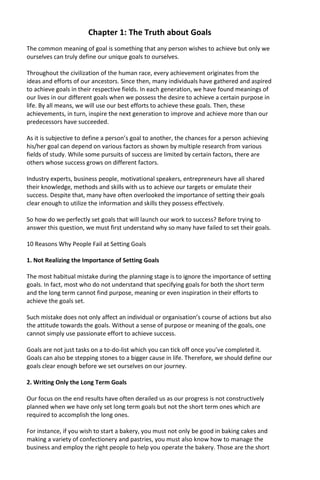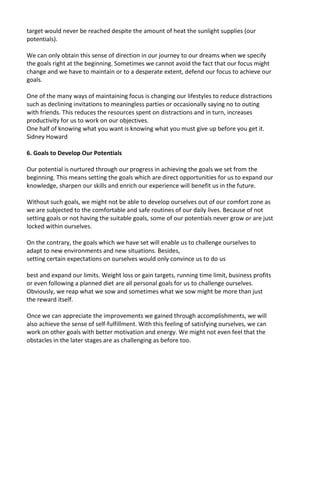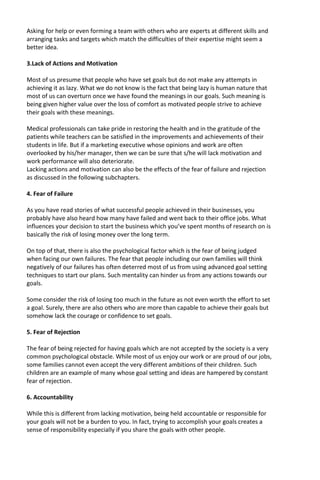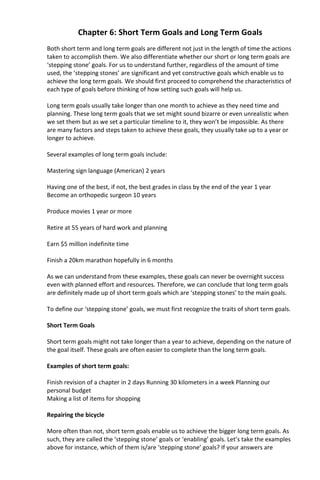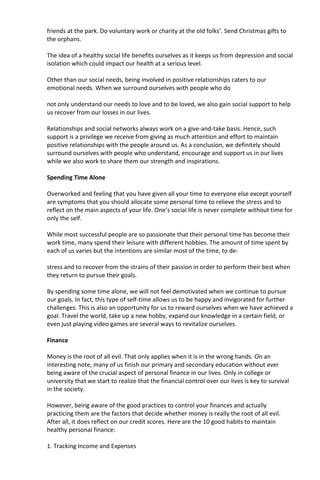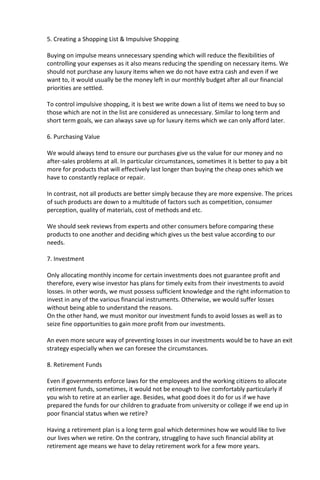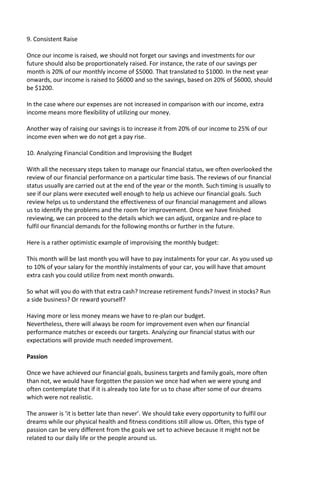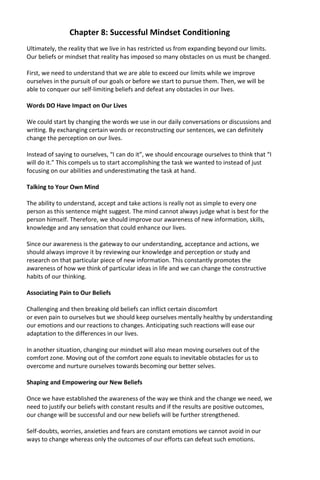Goal Crusher.pdf
- 2. Goal Crusher Jeff Walker © 2023 Jeff Walker All rights reserved. Author: Jeff Walker Email: engineermonirulalam@gmail.com Whatsapp: +88 01791681662 Skype: monirulalam2
- 3. Disclaimer Every effort has been made to be accurate in this publication. The publisher does not assume any responsibility for errors, omissions or contrary interpretation. We do our best to provide the best information on the subject, but just reading it does not guarantee success. You will need to apply every step of the process in order to get the results you are looking for. This publication is not intended for use as a source of any legal, medical or accounting advice. The information contained in this guide may be subject to laws in the United States and other jurisdictions. We suggest carefully reading the necessary terms of the services/products used before applying it to any activity which is, or may be, regulated. We do not assume any responsibility for what you choose to do with this information. Use your own judgment. Any perceived slight of specific people or organizations, and any resemblance to characters living, dead or otherwise, real or fictitious, is purely unintentional. Some examples of past results are used in this publication; they are intended to be for example purposes only and do not guarantee you will get the same results. Your results may differ from ours. Your results from the use of this information will depend on you, your skills and effort, and other different unpredictable factors. It is important for you to clearly understand that all marketing activities carry the possibility of loss of investment for testing purposes. Use this information wisely and at your own risk.
- 4. Legal Notice All right reserved. No part of this book may be reproduced or transmitted in any form or any means, electronic or mechanical, including photocopying, recording, or by any information storage or retrieval system, without permission in writing from the Author and Publisher. All the product names or logos described within this manual are the trademarks and/or copyrights of their respective owners of the product names or logos has authorized or approved this publication. This publication contains the opinions and ideas of its author and is designed to provide useful advice to the reader on the subject matter covered. Any references to any products or services do not constitute or imply an endorsement or recommendation. The Author and Publisher strive to be as accurate and complete as possible in the creation of this book, but do not guarantee that the information or suggestion will affect everyone who reads it. The Publisher and Author specifically disclaim any responsibility for any liability, losses or damages of any kind as a consequence, directly or indirectly arising from the use and/ or application of any content of this publication. Screen shots seen in this manual are from publicly accessible files and are used as “fair use” for reporting purposes and to illustrate the various points mentioned within. Texts and images available over the Internet may be subject to copyright and other intellectual rights owned by third parties
- 5. TABLE OF CONTENTS Chapter 1: The Truth about Goals 10 Reasons Why People Fail at Setting Goals What is Goal Setting Chapter 2: The Power Of Goal Setting Chapter 3: Goal Crushing Techniques Bigger Picture The Goal Competition Set Goals which are S.M.A.R.T. Chapter 4: Reasons Of Failures Chapter 5: Goal Crushing Shortcuts Visualizes Your Goals Chapter 6: Short Term Goals and Long Term Goals Long Term Goals Short Term Goals Stepping Stone Goals Goal Length Chapter 7: Balancing Your Life Health Family and Friends Spending Time Alone Finance Chapter 8: Successful Mindset Conditioning Words DO Have Impact on Our Lives Talking to Your Own Mind Associating Pain to Our Beliefs Shaping and Empowering our New Beliefs Conditioning until Success Becomes Second Nature About Author
- 6. Chapter 1: The Truth about Goals The common meaning of goal is something that any person wishes to achieve but only we ourselves can truly define our unique goals to ourselves. Throughout the civilization of the human race, every achievement originates from the ideas and efforts of our ancestors. Since then, many individuals have gathered and aspired to achieve goals in their respective fields. In each generation, we have found meanings of our lives in our different goals when we possess the desire to achieve a certain purpose in life. By all means, we will use our best efforts to achieve these goals. Then, these achievements, in turn, inspire the next generation to improve and achieve more than our predecessors have succeeded. As it is subjective to define a person’s goal to another, the chances for a person achieving his/her goal can depend on various factors as shown by multiple research from various fields of study. While some pursuits of success are limited by certain factors, there are others whose success grows on different factors. Industry experts, business people, motivational speakers, entrepreneurs have all shared their knowledge, methods and skills with us to achieve our targets or emulate their success. Despite that, many have often overlooked the importance of setting their goals clear enough to utilize the information and skills they possess effectively. So how do we perfectly set goals that will launch our work to success? Before trying to answer this question, we must first understand why so many have failed to set their goals. 10 Reasons Why People Fail at Setting Goals 1. Not Realizing the Importance of Setting Goals The most habitual mistake during the planning stage is to ignore the importance of setting goals. In fact, most who do not understand that specifying goals for both the short term and the long term cannot find purpose, meaning or even inspiration in their efforts to achieve the goals set. Such mistake does not only affect an individual or organisation’s course of actions but also the attitude towards the goals. Without a sense of purpose or meaning of the goals, one cannot simply use passionate effort to achieve success. Goals are not just tasks on a to-do-list which you can tick off once you’ve completed it. Goals can also be stepping stones to a bigger cause in life. Therefore, we should define our goals clear enough before we set ourselves on our journey. 2. Writing Only the Long Term Goals Our focus on the end results have often derailed us as our progress is not constructively planned when we have only set long term goals but not the short term ones which are required to accomplish the long ones. For instance, if you wish to start a bakery, you must not only be good in baking cakes and making a variety of confectionery and pastries, you must also know how to manage the business and employ the right people to help you operate the bakery. Those are the short
- 7. term goals of getting everything prepared before realizing the long term goal of operating a bakery. Setting short term goals in sight of the long one is to help us focus on one goal at a time and build on each success to reach further and apparently achieve our long term goals. Usually, this sort of achievement satisfies us even more in the end. 3. Pre-Belief that It Won’t Work Those who have such belief usually have very consistent reasoning on rejecting certain ideas before reaching the final stages of setting their goals. As such, during the stages of setting goals, one should embrace the foreseeable challenges after sufficient analysis and not discouraged by them. However, over-analyzing and constantly filling ideas and efforts with doubts will definitely end the goal setting process earlier than expected. During the stages of goal setting, we also have to acknowledge that it would not be possible to answer all the questions and create substantial plans to overcome the foreseeable challenges. 4. Writing Our Goals as Negative Statements Instead of working towards something we want, writing our goals as something we try to avoid or as obstacles we do not wish to overcome may affect our motivation to finish work. How we write our goals down can really affect how view it. In other words, nobody wants their goals to sound discouraging. Writing “Don’t lift less than 120lbs for your bench press” definitely does not sound as inspiring as “Good job on lifting 100lbs on the bench press. Try lifting 120 lbs next week.” The way the goals are written should inspire us to be dedicated to our goals and not try to instill the fear of failure in us. 5. Generic Goals Having goals which are often too similar to others around your age usually means the goals you have set are not specific enough. So how does this deter you from being successful? Not having enough details of how your goals should specifically be means the effort which you will use might not be able to help you achieve whatever targets. For instance, if you wish to buy a house, you must find out the market price of the house, its size, its design, the loan repayment, interest rates of the loan, the location of the house and many other necessary factors for you to purchase the house successfully. Whether it’s a vacation you’re planning or increasing profits of your business, the more you specify your goals, the clearer it is in your mind that you are convinced these are the goals you really wish to achieve.
- 8. 6. Measuring results Business leaders and entrepreneurs often face this problem of utilizing the right tools to measure the progress of their businesses. Those who have no idea how to measure the progress of their work during the goal setting process are doomed to fail. Most are disillusioned by monetary profits they gained earlier on. Measuring results is not only a good way of ensuring you are on the right track to your long term goals. Besides, it gives you the chance to improve results based on the goals you have specified during goal setting. 7. Setting irrelevant goals Wasting time on goals which are not relevant to the aim or missions in your life will not benefit you in the long term. Besides, having too many goals at one time and not being able to produce results for each goal after so much effort will only damage your progress towards the long term goal. Stay focused on the goals and try to achieve one goal after another. 8. Setting unrealistic goals If you set goals which you could not realistically achieve over a certain period of time, you will feel discouraged and eventually will give up on chasing after your goals. So don’t kill your chances of achieving your goals by being unrealistic. In setting your goals, you must set short term goals or stepping stones for you to reach the bigger goals. These ‘stepping stones’ will also nurture you for face bigger challenges in your pursuit of your dreams. At the end of the day, it’s important to be ambitious but not too unrealistically excited. 9. Not having reasonable timeframe for achievement While you can measure results with the realistic goals you have set, time is always an important factor as any delay in achieving your goals means less can be done to achieve it. Some goals have their time limits and so, progress must be measured over certain amount of time. For instance, you worked out that, to have your dream vacation in July 3 years from now, you must save up about 10% of your salary every month. Otherwise, you will not have enough money for the vacation by then so it’s crucial that you save as much even if the amount you save each month can be different. 10. Opinions of others The opinion of others may have considerable weightage in our goal setting process especially if these people are close to us like our family, colleagues and friends. It is therefore understandable that we may have set our goals based on most of their opinions.
- 9. The risk of setting the ‘goals of others’ under the illusion that you share those goals might actually be similar to the risks of setting irrelevant goals as you have read in mistake no. 7. If those goals are solely based on the opinions of others, you will not be able to feel the satisfaction of achieving them especially if they are not truly your goals. What is Goal Setting After learning of the common mistakes of goal setting, it is easy to believe that we could achieve our goals as long as we could define the obstacles and the methods to succeed. However, what most people have neglected throughout their journey of pursuing success is the sheer determination to sacrifice many other things along the way. Instead of asking ourselves questions like “What kind of success do you wish to have? How much resources are you willing to use to reach your goal?”, we must be able to answer “How badly do you want to do this? How much can you sacrifice for this?” What motivates us must not only be extrinsic, it must also be intrinsic. Many want to be famous and successful with their work but few realised that having goals is just the easy part. After all, very few people can give up their lifestyles, doubt their beliefs or even risk their relationships with people to thrive. The sky is the limit. Everybody wants a gold medal. Not many are willing to train, eat and live like a world champion. In other words, setting goals with only the future rewards in sight will not prepare us well mentally. To be the best, we must be able to bear all the costs to reach our goals.
- 10. Chapter 2 The Power of Goal Setting “The victory of success is half won when one gains the habit of setting and achieving goals.” Og Mandino Goal setting, as we have heard many times, is the very first step in our efforts to achieve our dreams. Our dreams can never turn into reality if we just dream about it without any goals in mind. We can try to imagine ourselves being in the same position in our lives after wasting 30 years, using various ways to achieve our dreams, just to realize that we never really reached any goals to bring us closer to our dreams. It would have been a desperate failure from the start. To understand where our next few steps or goals towards reaching success, we should recognize these 6 essential reasons for us to set our goals in the right way. 1. Goals as the Force of Motivation Goals drive us towards our achievements as it acts as the force of our motivation. To connect to our inner force or desire, goal setting is the first step we take towards our achievements. In both short term and long term, it gives us a target to aim at, a destination we wish to travel to or even a particular number we try to arrive at. This is the point which gets us excited and passionate as we work very diligently towards our goals. While it is common that our efforts to achieve these goals are full of enthusiasm and energy in the beginning, it is important for us to know how much these goals personally mean to ourselves. In such way, setting goals which we know we would truly be passionate about in the long term will help us accomplish our missions in a more sustainable manner. After all, if we are not consistently motivated, we would suffer from the burn outs of trying to achieve meaningless goals. 2. Goals as Visual Representations of Our Dreams Imaginations, visualizations, fantasies or even dreams are not just unrealistic concepts based on our utilizable knowledge if we have set our goals towards them. Because of this, goal setting plays a vital role in ensuring our belief in our methods, our analysis of our results and our efforts in chasing after every resource needed. Instead of setting one goal as the only way to reach our dreams, we can conceptualize our dreams as a set of puzzles and the goals we set are pieces of puzzles we need to design, fix or even match to complete this set of puzzle. We can also regard each goal as a stepping stone towards our desired destination. As a result of achieving each goal, like finding each puzzle, we are closer to assembling the whole picture of our dreams (the complete set of puzzle). So yes, don’t be afraid to dream!
- 11. 3. Goals to Track Progress Since some goals are the foundations for us to build on to reach another goal, arranging them to be accomplished first will be vital for us to track the progress of our work. As mentioned above that goals are like stepping stones to our main goal, goals also serve to help us track our progress in our work. This can be interpreted as accomplishing each goal will bring us closer to achieving our targets. Whereas achieving our goals means increasing our chances of succeeding, we also have to track our work in progress by assessing how a work can be done and the amount of time needed. These goals can also be inter- related to one another as we cannot progress with specific work if one objective or goal is not reached. One particular situation to exemplify such concept is the work of organizing a birthday party for our family. The first step is always to send out the invitations and then confirming the number of guests attending. Without these first two steps, it would be challenging to arrange for the venue, the amount of food and drinks, the decoration and other aspects which will complete the party. The invitations and the number of guests attending are the two vital factors to the success of the party. In conclusion, some work cannot simply progress without completing certain goals first. 4. Goals as Promises to the Self The goals we have set to achieve are also promises we made to ourselves. In recording our goal setting process, it is also important that we ensure these concrete goals and give ourselves a particular timeline to achieve each goal. Other than that, these ‘promises’ also keep us responsible for every of our actions which lead us to the failure or success of our plans. With this sense of responsibility instilled in ourselves, this allows us to re-evaluate our actions and scrutinize the consequences whether in a short period or in the long term. One can definitely take pride in his/her success when recalling of the decisions s/he took 2 years or even 20 years ago. On the other hand, if one fails or accomplishes less than the set goal, then it is a definite sign to change ways to improve and achieve whatever the set goal is. 5. Goals as the Direction of our Focus Setting goals also means setting our mind, our heart and our soul to the target. In another metaphorical sense, we simply cannot shoot an arrow without a target. Upon setting our goals, we will know how, where and when to use our talent and abilities. Like a magnifying glass concentrates the sunlight towards the leaf, the leaf is then burnt. The sunlight is our abilities whereas the magnifying glass is likened to our focus on the target and the leaf, obviously, is the target. Without the magnifying glass (our focus), the
- 12. target would never be reached despite the amount of heat the sunlight supplies (our potentials). We can only obtain this sense of direction in our journey to our dreams when we specify the goals right at the beginning. Sometimes we cannot avoid the fact that our focus might change and we have to maintain or to a desperate extent, defend our focus to achieve our goals. One of the many ways of maintaining focus is changing our lifestyles to reduce distractions such as declining invitations to meaningless parties or occasionally saying no to outing with friends. This reduces the resources spent on distractions and in turn, increases productivity for us to work on our objectives. One half of knowing what you want is knowing what you must give up before you get it. Sidney Howard 6. Goals to Develop Our Potentials Our potential is nurtured through our progress in achieving the goals we set from the beginning. This means setting the goals which are direct opportunities for us to expand our knowledge, sharpen our skills and enrich our experience will benefit us in the future. Without such goals, we might not be able to develop ourselves out of our comfort zone as we are subjected to the comfortable and safe routines of our daily lives. Because of not setting goals or not having the suitable goals, some of our potentials never grow or are just locked within ourselves. On the contrary, the goals which we have set will enable us to challenge ourselves to adapt to new environments and new situations. Besides, setting certain expectations on ourselves would only convince us to do us best and expand our limits. Weight loss or gain targets, running time limit, business profits or even following a planned diet are all personal goals for us to challenge ourselves. Obviously, we reap what we sow and sometimes what we sow might be more than just the reward itself. Once we can appreciate the improvements we gained through accomplishments, we will also achieve the sense of self-fulfillment. With this feeling of satisfying ourselves, we can work on other goals with better motivation and energy. We might not even feel that the obstacles in the later stages are as challenging as before too.
- 13. Chapter 3: Goal Crushing Techniques After reading the previous chapter, you probably have a better idea that goal setting would have eased or improved the pursuit of our goals. After all, we hope that we would definitely be rewarded with our goals for whatever efforts we use. As a start to our long term ambitions, it will be best if we can set our goals in the perfect manner as suggested in the coming chapter. The Bigger Picture Now, try to imagine the success you wish to achieve in your life in the distant future e.g. the next 10 years. You could either describe this picture by writing, talking about it or even watching videos of people whose success you wish to emulate. The next step is to further refine the details of this success by including the details into the picture or description you have just created. The more specific, the better. These might be the ‘stepping stones’ or the smaller goals to determine how you can reach the ‘bigger picture’ type of success. Now that you have a rough idea of the success you wish to achieve in the future, it is time to set goals by writing them down or recording them in other ways. Set Goals that Motivate You Part 1 Goals with motivational elements, whether intrinsic or extrinsic, are the best reasons we can give ourselves to thrive in life. Passion, commitment, sense of urgency, enthusiasm, creativity and many other positive traits are products of goals which motivate us. Nevertheless, some of us have had the problems of having too many goals which we were passionate about. When we reach the end of working towards too many goals, we would have drained all our energy out but we achieve very minimal of these goals. Therefore, before we set out to our tireless work towards our exhilarating cause, we must decide the winner(s) of this ‘goal competition’. The Goal Competition So how do we score in this competition? Firstly, we must understand that some goals may prevent us from reaching the others regardless of how obsessive we are. Some goals may take us longer time to achieve the ‘bigger picture’ even if they are the easiest to achieve compared to others. Meanwhile some goals must be achieved first before we proceed to the next goals (discussed in chapter 2, pg.) Do we priorities the most motivating goal or start with the easiest ones? How about those which are more rewarding but takes a longer time to achieve? While the answers to such questions are subject to every individual’s preferences and strategies, they are the questions we have to answer during the stage of goal setting. In short, the goals are basically competing with one another to be our priorities. We score the goal of this competition by deciding the winner(s) of this competition and then we could understand which goal we should first concentrate on. This will save us from exhaustion, vain efforts, lack of focus, energy, emotions and most importantly, our motivations to continue our work on the future goals.
- 14. While we can decide to adjust the level of priorities on each goal, at least, we can anticipate the outcomes of our actions better from the beginning. Set Goals that Motivate You Part 2 What makes these ‘winner’ goals unique from other goals? We find the deepest meanings in these goals which we are willing to devote our time and resources to. They are not only the ‘winners’ of the goal competition but they are also our ‘motivators’. In our quest to accomplish these goals, we will be tempted to set new goals and try to accomplish them. However, goals which truly motivate us will withstand the competition from other new goals and we will be dedicated to finish these goals before the new ones. In other circumstances, our efforts on long term goals will be further justified with rewards for our motivation. This further fuels our motivation for the next goals. To reinforce the motivation which we first found in the goals we have decided to work on, we should write down why it’s meaningful, important and valuable to us. Then, we can ask ourselves, “How do I convince other people that these goals are worth my effort, time and resources?” The answer to this question will form the deep meanings and become the motivation for us to carry on despite our doubts and our diminishing confidence in our struggles to achieve the goals. It is the best reminder of our promise to commit ourselves to the cause. Set Goals which are S.M.A.R.T. Specific, Measurable, Attainable, Relevant and Time bound goals are goals which we refine based on the ‘winner’ goals from the goal competition before finalizing our goals. In such way, our meaningful and motivating goals will not be only temporary passion without concrete planning then. Specific goals Goals which are not clearly defined will not lead us to our desired destinations in life. If the goals are our destinations but we cannot specify them, we will probably lose our directions during our work even if we are presented with multiple methods to achieve our goals. As mentioned in this chapter and also the previous one, we will waste a lot of resources if we do not have conviction in the specificity of our goals. Remember, goals show us the way so we must spell out every single detail to get us to where we want. Measurable Goals Goals which are immeasurable are those which are vaguely defined and hence, we will not be able to track our progress. Quantifying both our progress and goals and then comparing both can indicate our performance and success rate. Such indication could also be used as analysis for further improvements in our performance. Body weight management programs, budgeting, running distance and time, building construction and many other goals have been made up of absolute quantifications. Using
- 15. measurements of results, we can tell how much we have improved or progressed and we won’t even miss the celebration without knowing we have achieved certain goals! Attainable Goals Setting goals which are realistically possible to achieve means building more success on top of another. In contrast, working on goals which are impossible or too challenging to achieve will only break our perseverance and determination in the long term. We will surely lose motivation if we cannot achieve any rewards we wish for despite our best efforts. In spite of such idea, we should always resist the appeal of setting goals that are too easy to accomplish. This is because constantly setting easy goals will generate a comfort zone for us. While we indulge in completing these easy goals, we become insensitive to our needs to improve. In the end, we are so afraid of failures and non-achievement that we will not risk setting a more challenging goal. The particular way of setting such goals is to divide the goal into measurable upper and lower bounds. For instance, if you have reached the lower boundary of your goal, e.g. the running distance of 5 kilometers in 30 minutes, instead of running the same distance in the same amount of time, you could try to run further in 30 minutes or run the same distance in shorter time. These goals can be adjusted from time to time but in certain situations like running, we can definitely attempt at a longer distance knowing we have achieved during the run itself. In other words, we set attainable goals to be aware of the level of difficulties and the rewards for our efforts. We have to adjust the levels of difficulties to our preferences so as not to fall into our comfort zone or feel de-motivated in the future. Relevant Goals Concentrating on relevant goals does not only save us from unnecessary venture into other distractions. It also allows us to practice our best skills, expand our knowledge in particular subject and gain invaluable experience for future growth. It sometimes can be difficult for us to separate the goals which we are very eager to accomplish from the ones which we feel are relevant and beneficial to our future. Therefore, it is a primary yet very essential step to ensure our goals are constantly relevant. Time bound goals Deadlines, time limits or even day by day progress are some of the measures we can set for ourselves to ensure progress. Besides, setting goals with a certain time frame will help us anticipate delays and prevent any unnecessary delays. Without such sense of timing, there will be less or no urgency for us to complete even the easiest tasks. As such, our commitment will dwindle and we might even start to get comfortable with procrastinating work.
- 16. Thus, we must always remind ourselves of the expected development in the timeline we have set for our dreams to come true. Writing Your Goals and Keeping Up Now that we have understood all the S.M.A.R.T goal setting concepts, we must not forget that we have to write our goals down and set reminders. To get these reminders to be more effective, we can set them on our phones or even place sticky notes in places like our work desk, on the refrigerator with the magnets or even on our TV.
- 17. Chapter 4: Reasons of Failures Failure is the key to success; each mistake teaches us something. Moriches Yeshiva, founder of Japanese martial art of Aikido Letting anyone else judge our failures might never be as good as our assessment of our own efforts and our analysis of the results. This simply is because we learn best about ourselves as compared to anyone else. However, developing these self-learning habits does not have to be all about ourselves. We can also learn from the mistakes of others for our personal growth. Other than the 10 reasons people fail at goal setting (discussed in chapter 1), the following are the 10 most common causes of failures that many of us have failed to address. 1. Disciplines and Habits In order to secure our goals in a more comfortable and convincing manner, most of us practice certain disciplines to ensure consistency in our efforts. Once the difficulties in completing the other goals increases, aside from our knowledge and skills, we have to rely on the basic disciplines and experiences we have developed throughout the earlier stages of our projects on our goals. Another example of such discipline would be widely witnessed in sports where training, diet and even sleeping time have to be strictly adhered to for the best performance. Since various sports deals with the physical limits, many sportspeople have to give up their preferred lifestyle to follow the disciplines set by the scientists and experts in their respective sports. We are what we repeatedly do. Excellence, therefore, is not an act but a habit. – Aristotle 2. Lack of Personalized Planning Goal setting simply is not always a detail plan as to how every action should be executed. This common misconception meant that many people do not personalize their plans to suit themselves in many aspects. In many cases, excellent goal setters do not recognize the significance of personalizing a plan to achieve their goals. Instead of understanding how their abilities and knowledge can be utilized for the project in a well- planned way, they become poor at executing their plans which are not suitable for themselves. Just like in any soccer team, you cannot expect a well-trained defender to play as a forward during a competitive match. He might not score, create or assist in any goals not just because he was trained as a defender but also his natural talents are not equivalent to a forward’s.
- 18. Asking for help or even forming a team with others who are experts at different skills and arranging tasks and targets which match the difficulties of their expertise might seem a better idea. 3.Lack of Actions and Motivation Most of us presume that people who have set goals but do not make any attempts in achieving it as lazy. What we do not know is the fact that being lazy is human nature that most of us can overturn once we have found the meanings in our goals. Such meaning is being given higher value over the loss of comfort as motivated people strive to achieve their goals with these meanings. Medical professionals can take pride in restoring the health and in the gratitude of the patients while teachers can be satisfied in the improvements and achievements of their students in life. But if a marketing executive whose opinions and work are often overlooked by his/her manager, then we can be sure that s/he will lack motivation and work performance will also deteriorate. Lacking actions and motivation can also be the effects of the fear of failure and rejection as discussed in the following subchapters. 4. Fear of Failure As you have read stories of what successful people achieved in their businesses, you probably have also heard how many have failed and went back to their office jobs. What influences your decision to start the business which you’ve spent months of research on is basically the risk of losing money over the long term. On top of that, there is also the psychological factor which is the fear of being judged when facing our own failures. The fear that people including our own families will think negatively of our failures has often deterred most of us from using advanced goal setting techniques to start our plans. Such mentality can hinder us from any actions towards our goals. Some consider the risk of losing too much in the future as not even worth the effort to set a goal. Surely, there are also others who are more than capable to achieve their goals but somehow lack the courage or confidence to set goals. 5. Fear of Rejection The fear of being rejected for having goals which are not accepted by the society is a very common psychological obstacle. While most of us enjoy our work or are proud of our jobs, some families cannot even accept the very different ambitions of their children. Such children are an example of many whose goal setting and ideas are hampered by constant fear of rejection. 6. Accountability While this is different from lacking motivation, being held accountable or responsible for your goals will not be a burden to you. In fact, trying to accomplish your goals creates a sense of responsibility especially if you share the goals with other people.
- 19. Having responsibilities on your goals means you will not give up easily and will try your best to achieve these goals. Nevertheless, we should not see such responsibilities as burdens as we remind ourselves the passion and meaning we derived from our goals in the earlier stages. 7. Lack of Review of Work and Analysis of Results The rate of improvement in performance can be affected by the lack of review, whether we succeed or fail in our work. While many can argue that monitoring progress can surely determine excellence, the habit of reviewing the details of our actions is a very beneficial work ethic that we should embody. In teaching the subject of Mathematics to weaker students, teachers would often help students discover why their answers are often incorrect by teaching them to review the steps taken to solve the mathematical problem. Once the teacher identifies and explains the mistake in the steps involved, the student will remember not to make the same mistake through thorough practice for the same type of Math’s question. We can typically compare our work with reviewing steps taken to solve a Math's question. Often, we may get the assistance of others to review our work or problems as we may not share the same perspective. The opinions of an experienced expert or a more knowledgeable colleague will be useful for your learning of your work. More often than not, we tend to overlook improvement especially when the results indicate no room for further improvement. It may take some of our time to review our work but it definitely can be an excellent learning curve for our future. 8. Surrounded by Negative Vibes We can never downplay the influence of the people around us, whether they are family, friends or even our neighbors. In common perception, the closer these people are to us, the more weight their opinions carry on our life decisions. In certain circumstances, some of them might discourage us from pursuing our goals. The common reason is the risk and the costs of pursuing our goals are not worth our resources and time as they are not as rewarding. While they have very valid reasons to dissuade us, the choice will still be ours to make. To a certain extent, some of our naysayers may even affect our emotions to justify their opinions and strengthen their beliefs in facts. Whereas some have very kind intentions, what they do have to respect is our rights to have the final say in every decision of our lives. On a more positive note, we should take their opinions, whatever facts and figures which can help us to research on our goals even more. As our research helps us gain even more information on our goals, then we can decide to work on our goals or have different goals. 9. Too Much Focus on the Goal Itself Success is a journey, not a destination. The doing is often more important than the outcome. Arthur Ashe
- 20. Intense concentration on the goal itself might reduce our happiness over the long run. We place such excessive pressure on ourselves to perform to certain standards that this amount of stress can really affect our living pleasures. The more advisable thinking of our goals is to direct our focus on daily practice instead of wishing to achieve long term goals in the least amount of time. In this condition, we can also question ourselves whether our goal-based mentality is putting so much stress that we ignore life after these goals. If we wish to progress beyond accomplishing these goals, then we must release the need to obtain results immediately as some goals will inevitably require time. 10.Downplaying Your Achievements One of the ultimate sources of motivation is the reward itself. Because of this, we must not downplay our achievements or be too humble that we chose not to give credit to ourselves. This mentality not only depletes us of the necessary fuel to chase after our dreams but also our self-confidence in the long term. While there are many ways to celebrate an achievement, the scale of such celebrations should not risk our developments of other goals as though we have lived to accomplish that one particular goal in life.
- 21. Chapter 5: Goal Crushing Shortcuts With the suitable set of skills and knowledge, now you establish the work you planned to achieve your goals. Along this journey, there are a few more ways other than the plans you have made to help you conquer certain obstacles especially those which are not work- related. Visualizes Your Goals As written in chapter 3 How to Set Goals, the imagination of the ‘bigger picture’ and the details is part of a visualization technique used by successful athletes, professionals and business people. In other words, we can be vying.” At this stage, we should understand the motivational strength of our mental pictures. However, the focus of the visualization technique in this chapter differs from that of goal setting as this type of visualization is more process- based. Rather than focusing on imagining you achieving the goal and its details, we should also visualize each step needed to accomplish the goal. For instance, to gain muscles up to the weight of 80kg, we could imagine the body shape, tone and size of the muscles of the ideal body which we want have. What we could have possibly missed out is the process of going to the gym, sweating out, straining each of those muscles to our limits and then experiencing the sore for a few days every week in those few months we try to achieve our goal. From the example above, while visualizing the process, we have to take our sacrifices and the costs into account, not just the rewards of our goals. This will further enhance our mental strength and ensure that we are better prepared to anticipate the challenges ahead. Being Accountable Passion, motivation and inspirations are best paired with a sense of responsibility of our goals. Developing accountability or responsibility is not just an action plan or an action that we can accomplish. It is a type of character building that requires longer time to instill in ourselves. Subject to individual preferences, many people have various methods of developing such discipline. A few examples such as not avoiding difficulties, announcing our goals to our family and friends, ensuring we complete each task can help us to understand that being accountable for our own goals inspire us to help ourselves and other to be committed. Some individuals even subject themselves to the reward-penalty system by penalizing themselves if they fail to accomplish a job or a goal. While this system sometimes discourages those who are afraid of failure and those who do not benefit from learning of their failure, some organizations prefer to utilize this system to instill fear of failure in their members. Building Rapport with The Right People
- 22. Building relationship with people at work like colleagues, clients, our employers or even friends of our friends means creating an inter- dependence system where both you and them can decide to help each other in the long term. Once such system of relationships is developed, we should look for opportunities to help others first before they are open themselves up to help us back in return. Why help first and wait for help in return? This mindset is derived from the fact that people usually are too busy with their own lives and work that they rarely think of going out of their own way to help unless they are called upon. Therefore, helping out people without harming ourselves and the chances of reaching our own goals will further strengthen the relationship we have with people. In helping out, we will not only receive appreciation and gratitude in return but also an open mind and a kind heart. While our efforts and generosity to help might be forgotten or people whom we have helped do not even return us a favor in the future, believing in the goodwill of people and the bigger chances of a return naturally will be in our path. Instilling Willpower in Ourselves The basic element of focus and motivation is undeniably willpower. Developing willpower means resisting temporary temptations in order to achieve our goals in the future. When we have developed our willpower to a certain level, we are able to sacrifice our indulgences just to work more effectively to achieve better results. For instance, we can practice this by taking an extra hour for more different running exercises to build our stamina for the marathon instead of watching our favorite TV show or skipping a movie date with our friends for that extra progress on the month long project we have been working on. You will be surprised how far willpower can help us improve in anything we do throughout our lives. * Nurture habits which enable us to focus on our progress instead of disrupting us. For instance, the goals of losing weight mainly depend on the diet and exercise designed for the individual. If s/he refuses to follow a particular diet and constantly eats high calories food or unhealthy ones, losing weight will be even more difficult than the plans suggested so. * Following a routine is another way of cultivating a habit but it is more structured and therefore encourages us to build self-discipline. Examples of routines would be our exercise schedules and our budgets whose targets we remind ourselves with. * The ultimate aim of following routines and cultivating habits is to build self- discipline which reflects our commitment towards our goals after we have set our plans. For instance, the students with the best grades in class often possess certain amount of control in them lives with the effort and time they used for their studies and work. Tracking Progress, Analyzing Results & Making Adjustments A goal or a plan that was put in place would definitely require particular knowledge, methods or tools for us to measure progress as well as to analyses results of our work
- 23. within stipulated time. Without such necessary measurements of the results and progress, whether qualitative or quantitative, we may not be optimistic of our improvements especially because we could not make significant changes to our methods or work in the future. Once we have built discipline and have accomplished more than the necessary tasks to achieve a goal, we must constantly track our progress to ensure the development of our work towards goals. There are many ways to track our progress such as providing reports after our work, writing a diary, or recording our work itself in video or other forms. Recording our progress and our work will not merely be a useless review of it. After the deadline, we can use such records to make further adjustments to our work in the future. As an example of tracking progress in personal financial planning, some of us collect every single receipt we receive and write down our daily expenses to indicate our next few steps in our budgeting goal. Whether it is to reduce expenses for future investments or to allocate funds for our children’s education, such are necessary steps to ensure wise financial planning in the long term. This also enables us to gain experience of overcoming similar obstacles in the future. Conquering Difficulties Throughout our progress, we will surely face obstacles and different difficulties, whether a problematic one or an easy to solve one. If the problem is one we have experienced before, it will be easier if we have recorded it in our reviews as we would acknowledge better solutions to it. However, the most important thing in facing every problem is to understand the core of the causes and our options in solving it. Then, whether as a team or individual, we have to stay calm and maintain our composure so that we can evaluate the options we are offered by the circumstances. It is never embarrassing to seek assistance even if it does come with a price. If we cannot solve a problem but still have time to do so, then it would be best that we use another solution or alter the particular solution we chose to improve the outcome. This is where a backup plan is extremely useful especially if the problem was anticipated and the backup plan was well prepared. Our decision in choosing the best solution occasionally produces setbacks rather than the outcome we hoped for. Despite the setback, we should be optimistic that we can recover and improve from such setbacks. At least, it would be beneficial if we view it as an invaluable lesson. Nevertheless, there are certain causes in our work which are beyond our control such as natural disasters, illnesses and accidents. These are the unfortunate events which we must recover from. Besides, we must also focus on what we can control. Learn from Failures As it is easier said than done, many people, whether successful or not, face difficulties in learning from their failures, let alone face their failures. Firstly, we must not avoid the fact that our failure does not mean we cannot improve and progress from it. Because of this, we must be physically and mentally flexible to accept failure and move on.
- 24. The truth of success is that examining our failures can help us to adapt to new situations, assess improvised solutions and progress from our setbacks. Firstly, we can investigate the causes of our failures by reviewing every step of our preparations. If there was any fault detected there, we could rectify the problem and ensure that such mistake will never be repeated. Then, we also should assess our execution of the plans and be honest about our efforts and mistakes in it. While we might be biased in expecting that we have tried our best and find no fault in our execution, we can also seek the help of experts or more experienced colleagues to assess our work which we have recorded. Finally, we should find ways or develop a system to help us learn from such mistakes or failures to anticipate similar problems. Celebrating the Wins Anything that is not considered a failure should be celebrated as progress. Even if the success you have achieved is not worth the celebration, rewarding yourself by the minimum is encouraged as it will not only inspire you to progress further in achieving your goals, it will also strengthen your faith in yourself and your belief in achieving your goals.
- 25. Chapter 6: Short Term Goals and Long Term Goals Both short term and long term goals are different not just in the length of time the actions taken to accomplish them. We also differentiate whether our short or long term goals are ‘stepping stone’ goals. For us to understand further, regardless of the amount of time used, the ‘stepping stones’ are significant and yet constructive goals which enable us to achieve the long term goals. We should first proceed to comprehend the characteristics of each type of goals before thinking of how setting such goals will help us. Long term goals usually take longer than one month to achieve as they need time and planning. These long term goals that we set might sound bizarre or even unrealistic when we set them but as we set a particular timeline to it, they won’t be impossible. As there are many factors and steps taken to achieve these goals, they usually take up to a year or longer to achieve. Several examples of long term goals include: Mastering sign language (American) 2 years Having one of the best, if not, the best grades in class by the end of the year 1 year Become an orthopedic surgeon 10 years Produce movies 1 year or more Retire at 55 years of hard work and planning Earn $5 million indefinite time Finish a 20km marathon hopefully in 6 months As we can understand from these examples, these goals can never be overnight success even with planned effort and resources. Therefore, we can conclude that long term goals are definitely made up of short term goals which are ‘stepping stones’ to the main goals. To define our ‘stepping stone’ goals, we must first recognize the traits of short term goals. Short Term Goals Short term goals might not take longer than a year to achieve, depending on the nature of the goal itself. These goals are often easier to complete than the long term goals. Examples of short term goals: Finish revision of a chapter in 2 days Running 30 kilometers in a week Planning our personal budget Making a list of items for shopping Repairing the bicycle More often than not, short term goals enable us to achieve the bigger long term goals. As such, they are called the ‘stepping stone’ goals or ‘enabling’ goals. Let’s take the examples above for instance, which of them is/are ‘stepping stone’ goals? If your answers are
- 26. planning our personal budget, running 30 kilometers in a week and finish revision of a chapter in 2 days, then you finally understand that these goals are just parts of greater goals. Stepping Stone Goals Stepping stone goals enable us to create progress towards a greater, often long term goal. Since the duration taken to accomplish such stepping stone goals may vary depending on a multitude of factors, they cannot be characterized as short or long term goal. We must constantly remind ourselves that most, if not all, of the stepping stones are crucial to our achievement of the long term goal. Therefore, we can infer that failing to accomplish any of our stepping goals means jeopardizing our progress or even our opportunities to reach our long term or even lifetime goal. Consider adding the word ‘to’ to each of the following sentences. Finish revision of a chapter in 2 days to study other chapters for the year- end examinations Planning personal budget to allocate monthly repayment for the house mortgage Running 30km in the second week to prepare for the full marathon in 4 months Without such stepping stones, it would be impossible to achieve the greater long term goal. Hence, when setting long term goals, we set the timeline based on the amount of time, resources and our effort to accomplish these stepping stone goals. Upon achieving all these stepping stones and subsequently the long term goal, we can look forward to our lifetime goals like retiring at 55 with enough money and time to travel the world. As illustrated in the diagram below, we can conclude that each stepping stone goal will lead us to the long term goal and every long term goal can subsequently guide us to our lifetime goals. Goal Length The goal length for us to achieve our goals mainly depends on ourselves despite experts’ suggestions on the timeline we should follow. All these usually are down to our own resources and willpower to succeed. We have to instill in ourselves the mindset that it is possible for us to defy limits like time. Definitely, along our progress, we will lose motivation and next, productivity. Therefore, we start questioning if the length of time we set to finish our stepping stone goals is suitable for ourselves. To avoid such adversity in the future, we have to keep in mind the scale of the long term goal, which goal should be prioritized before others, how evident the progress is after completing each stepping stone and if the target is clear enough for us to maintain our motivations. * Is the scale of the long term goal too immense for each stepping stone goal? * Which goal should be accomplished before the next?
- 27. * Will the progress be evident enough to motivate us to run towards the finishing line? * Is the finishing line getting clearer and more realistic as we progressed? With these factors taken into consideration, we will not lose our focus, passion and confidence in our abilities to complete each goal. At this point, we can also develop systems to ensure each stepping stone goal is achieved according to the timeline and also to track our progress to our long term goal.
- 28. Chapter 7: Balancing Your Life In our quest to accomplish our every goal to the point of reaching our lifetime goal, we would often fail to control our passion and let it become an overwhelming obsession which takes over our lifestyle and even health. At this point, whatever we pursue will not become as important as our life. In other words, we have to balance our life of achieving goals and the other important aspects in our life such as our health, family, friends and leisure. In spite of everything, all day work and no play make Jack a dull boy or maybe even a sick boy. Setting goals in these aspects in our life is as equally important as the other goals we have set out to achieve. By spending less time or effort in these aspects, our progress in work might also be affected. It will be an inevitable challenge to balance all of them as we will be too busy for everything but every positive progress in any part of our lives will surely strengthen us to create further improvements in other aspects. Health When health is absent, wisdom cannot reveal itself, art cannot manifest, strength cannot fight, wealth become useless, and intelligence cannot be applied. Halophiles A cliché, repeated in multiple versions of quotes, serves to remind us that without our well-being, one simply cannot be productive in work, enjoy our love with our family and friends. Our health is the most vital aspect we cannot neglect whatever age we are at. Practicing a healthy lifestyle will improve the quality of our lives and those around us. It will not just increase productivity but also prolong our life. However, busy we are, we tend to maintain a nourishing and healthy diet (special occasions are exceptions!), exercise sufficiently and get enough sleep. It would be waste of our efforts to achieve our lifetime goals if we are not healthy enough to enjoy the sweetness of our victories longer. Family and Friends Humans are social creatures who cannot live without a single relationship with others. As such, every human is socially dependent on one another to survive right from our birth. It all started with our relationship with our mothers who give birth to us, and then expands to our other family members, and then friends and lovers and so on. But how important is our social life? Being socially healthy is as equally important as being mentally and physically healthy. Spending quality time with our family and friends is one of the social needs of an average person of whatever age. After a long day of business or work, don’t just go back to the TV, your phone or whatever electronic gadget. Try to connect with people and pay attention to their lives. Talk to your family more often. Arrange a date with your loved one. Take the children for a trip. Discuss a topic with your fellow enthusiasts. Have a drink with old friends. Make new
- 29. friends at the park. Do voluntary work or charity at the old folks’. Send Christmas gifts to the orphans. The idea of a healthy social life benefits ourselves as it keeps us from depression and social isolation which could impact our health at a serious level. Other than our social needs, being involved in positive relationships caters to our emotional needs. When we surround ourselves with people who do not only understand our needs to love and to be loved, we also gain social support to help us recover from our losses in our lives. Relationships and social networks always work on a give-and-take basis. Hence, such support is a privilege we receive from giving as much attention and effort to maintain positive relationships with the people around us. As a conclusion, we definitely should surround ourselves with people who understand, encourage and support us in our lives while we also work to share them our strength and inspirations. Spending Time Alone Overworked and feeling that you have given all your time to everyone else except yourself are symptoms that you should allocate some personal time to relieve the stress and to reflect on the main aspects of your life. One’s social life is never complete without time for only the self. While most successful people are so passionate that their personal time has become their work time, many spend their leisure with different hobbies. The amount of time spent by each of us varies but the intentions are similar most of the time, to de- stress and to recover from the strains of their passion in order to perform their best when they return to pursue their goals. By spending some time alone, we will not feel demotivated when we continue to pursue our goals. In fact, this type of self-time allows us to be happy and invigorated for further challenges. This is also an opportunity for us to reward ourselves when we have achieved a goal. Travel the world, take up a new hobby, expand our knowledge in a certain field, or even just playing video games are several ways to revitalize ourselves. Finance Money is the root of all evil. That only applies when it is in the wrong hands. On an interesting note, many of us finish our primary and secondary education without ever being aware of the crucial aspect of personal finance in our lives. Only in college or university that we start to realize that the financial control over our lives is key to survival in the society. However, being aware of the good practices to control your finances and actually practicing them are the factors that decide whether money is really the root of all evil. After all, it does reflect on our credit scores. Here are the 10 good habits to maintain healthy personal finance: 1. Tracking Income and Expenses
- 30. Undoubtedly, this is the fundamental step of any financial planning and controlling. As the average person, tracking income is not as complicated as tracking expenses especially if the sources of income are not many. Tracking expenses requires some discipline and consistency in our daily habits such as recording the amount of cash we spent, keeping the credit cards bill we paid, keeping receipts of our expenses, loan information, tax records and online purchases. It gives us a better idea of our personal finance and how it can help us to achieve our goals while reminding us to stay financially healthy by not spending more than our income. 2. Priority Allocations While it is most basic to suggest that we should plan our budgets, there are definitely certain priorities which we should priorities our finances for. When we receive our pay cheese at the end of the month, the first step will always be to allocate these funds to the priorities we set in line with our goals. Such priority funds may be our savings, loans, our children’s education, retirement funds and investments. By setting this as the first step of our budget, we can work out how much we have left to spend or to prepare for other necessities. 3. Emergency Funds Other than insurances which can cover certain amount of our losses in accidents, we are advised to keep up to 10% of our monthly income for emergency uses. For instance, having an accident which can keep us away from work means we can utilize these funds which we have already saved up before for our daily expenses. As surprise scenarios can be quite unpredictable, it is best we prepare the umbrella before the rain. 4. Staying Away from High-Interest Credit or Totally Away from Debts At some point in our lives, it would be almost impossible to stay free of loans. Because of this, we have to consider the loans with the lowest interest rates we can apply for to reduce our repayment. After all, any interest rate imposed upon the principal is the main income of the debtor. Paying way more than what we have borrowed will only increase unnecessary expenses. Besides, some creditors allow advanced repayments for us to finish the repayment before the planned payment period. In this case, we might even save up on the interest of the remaining payment period. Staying debt-free means gaining more income and also a better credit score which serves to be an indicator of our healthy financial status to creditors. Healthy credit scores allow us to obtain loan more easily in the future as well.
- 31. 5. Creating a Shopping List & Impulsive Shopping Buying on impulse means unnecessary spending which will reduce the flexibilities of controlling your expenses as it also means reducing the spending on necessary items. We should not purchase any luxury items when we do not have extra cash and even if we want to, it would usually be the money left in our monthly budget after all our financial priorities are settled. To control impulsive shopping, it is best we write down a list of items we need to buy so those which are not in the list are considered as unnecessary. Similar to long term and short term goals, we can always save up for luxury items which we can only afford later. 6. Purchasing Value We would always tend to ensure our purchases give us the value for our money and no after-sales problems at all. In particular circumstances, sometimes it is better to pay a bit more for products that will effectively last longer than buying the cheap ones which we have to constantly replace or repair. In contrast, not all products are better simply because they are more expensive. The prices of such products are down to a multitude of factors such as competition, consumer perception, quality of materials, cost of methods and etc. We should seek reviews from experts and other consumers before comparing these products to one another and deciding which gives us the best value according to our needs. 7. Investment Only allocating monthly income for certain investments does not guarantee profit and therefore, every wise investor has plans for timely exits from their investments to avoid losses. In other words, we must possess sufficient knowledge and the right information to invest in any of the various financial instruments. Otherwise, we would suffer losses without being able to understand the reasons. On the other hand, we must monitor our investment funds to avoid losses as well as to seize fine opportunities to gain more profit from our investments. An even more secure way of preventing losses in our investments would be to have an exit strategy especially when we can foresee the circumstances. 8. Retirement Funds Even if governments enforce laws for the employees and the working citizens to allocate retirement funds, sometimes, it would not be enough to live comfortably particularly if you wish to retire at an earlier age. Besides, what good does it do for us if we have prepared the funds for our children to graduate from university or college if we end up in poor financial status when we retire? Having a retirement plan is a long term goal which determines how we would like to live our lives when we retire. On the contrary, struggling to have such financial ability at retirement age means we have to delay retirement work for a few more years.
- 32. 9. Consistent Raise Once our income is raised, we should not forget our savings and investments for our future should also be proportionately raised. For instance, the rate of our savings per month is 20% of our monthly income of $5000. That translated to $1000. In the next year onwards, our income is raised to $6000 and so the savings, based on 20% of $6000, should be $1200. In the case where our expenses are not increased in comparison with our income, extra income means more flexibility of utilizing our money. Another way of raising our savings is to increase it from 20% of our income to 25% of our income even when we do not get a pay rise. 10. Analyzing Financial Condition and Improvising the Budget With all the necessary steps taken to manage our financial status, we often overlooked the review of our financial performance on a particular time basis. The reviews of our financial status usually are carried out at the end of the year or the month. Such timing is usually to see if our plans were executed well enough to help us achieve our financial goals. Such review helps us to understand the effectiveness of our financial management and allows us to identify the problems and the room for improvement. Once we have finished reviewing, we can proceed to the details which we can adjust, organize and re-place to fulfil our financial demands for the following months or further in the future. Here is a rather optimistic example of improvising the monthly budget: This month will be last month you will have to pay instalments for your car. As you used up to 10% of your salary for the monthly instalments of your car, you will have that amount extra cash you could utilize from next month onwards. So what will you do with that extra cash? Increase retirement funds? Invest in stocks? Run a side business? Or reward yourself? Having more or less money means we have to re-plan our budget. Nevertheless, there will always be room for improvement even when our financial performance matches or exceeds our targets. Analyzing our financial status with our expectations will provide much needed improvement. Passion Once we have achieved our financial goals, business targets and family goals, more often than not, we would have forgotten the passion we once had when we were young and often contemplate that if it is already too late for us to chase after some of our dreams which were not realistic. The answer is ‘it is better late than never’. We should take every opportunity to fulfil our dreams while our physical health and fitness conditions still allow us. Often, this type of passion can be very different from the goals we set to achieve because it might not be related to our daily life or the people around us.
- 33. For instance, most of us would love to travel and explore the world but lack the time and/or the money to do so. After spending most of our life trying to create a better future for our family and ensuring the best education for our children, we would not have the sufficient energy levels for certain activities like extreme sports (skydiving, mountain climbing, motorsports racing) or contact sports (mixed martial arts, soccer, basketball). In order not to miss such exciting passion, we have maintained these particular activities as our leisure when we are young and therefore, we must manage our passion so as not to affect the balance of other life aspects. Contribution “We make a living by what we get, but we make a life by what we give.”- Winston Churchill Giving back to the society is not merely an act of social responsibility as we understand that most of what we receive is indirectly given by the society and our environments. Kindness and generosity are the values we want to our next generation to inherit from us. We also wish that our children will understand that through these acts of generosity and kindness, we can improve the lives of people around us. Keeping this aspect in balance with our life will ensure our spirits are nourished and the meanings of our existence expand beyond our own perception to those who receive from us. After all, we can never define us own lives with only our achievements as we must always justify the meaning of our achievements to the people around us too.
- 34. Chapter 8: Successful Mindset Conditioning Ultimately, the reality that we live in has restricted us from expanding beyond our limits. Our beliefs or mindset that reality has imposed so many obstacles on us must be changed. First, we need to understand that we are able to exceed our limits while we improve ourselves in the pursuit of our goals or before we start to pursue them. Then, we will be able to conquer our self-limiting beliefs and defeat any obstacles in our lives. Words DO Have Impact on Our Lives We could start by changing the words we use in our daily conversations or discussions and writing. By exchanging certain words or reconstructing our sentences, we can definitely change the perception on our lives. Instead of saying to ourselves, “I can do it”, we should encourage ourselves to think that “I will do it.” This compels us to start accomplishing the task we wanted to instead of just focusing on our abilities and underestimating the task at hand. Talking to Your Own Mind The ability to understand, accept and take actions is really not as simple to every one person as this sentence might suggest. The mind cannot always judge what is best for the person himself. Therefore, we should improve our awareness of new information, skills, knowledge and any sensation that could enhance our lives. Since our awareness is the gateway to our understanding, acceptance and actions, we should always improve it by reviewing our knowledge and perception or study and research on that particular piece of new information. This constantly promotes the awareness of how we think of particular ideas in life and we can change the constructive habits of our thinking. Associating Pain to Our Beliefs Challenging and then breaking old beliefs can inflict certain discomfort or even pain to ourselves but we should keep ourselves mentally healthy by understanding our emotions and our reactions to changes. Anticipating such reactions will ease our adaptation to the differences in our lives. In another situation, changing our mindset will also mean moving ourselves out of the comfort zone. Moving out of the comfort zone equals to inevitable obstacles for us to overcome and nurture ourselves towards becoming our better selves. Shaping and Empowering our New Beliefs Once we have established the awareness of the way we think and the change we need, we need to justify our beliefs with constant results and if the results are positive outcomes, our change will be successful and our new beliefs will be further strengthened. Self-doubts, worries, anxieties and fears are constant emotions we cannot avoid in our ways to change whereas only the outcomes of our efforts can defeat such emotions.
- 35. Otherwise, we must recover from setbacks to establish another new change which will propel us towards another success. Conditioning until Success Becomes Second Nature Change is inevitable. But why change when you are already successful enough? More often than not, we can view success in multiple angles of perspectives. If you’re in an excellent financial condition, then you can start focusing on other aspects in your life. While it is true that nobody can be as successful in every aspect, it remains a challenge to have a balanced and successful life with our family, friends, business, the society and future generations. So why stop when you can be successful in more than one aspect in our lives?
- 36. About Author Jeff skill's with the IT industry has propelled him into many different online businesses, including book publishing, affiliate marketing, Clickbank Product Launch, niche business sites, and SEO work. He helps people to make money working through the internet. Jeff is also a budding author, with self-help being his favored genre. His titles to date include Affiliate Marketing Blueprint, Facebook Marketing Mastery, YouTube Marketing 101, Clickbank Success Secret, Adsence Cash Cow, Ultimate Passive Income, Email Marketing Secret, CPA Marketing Success Secret, Career in Freelancing, Blogging Success, and many more. He plans to follow these with even more titles in the future, to help as many people as he can to find the same success that he has. You can contact Jeff Walker here: Email: engineermonirulalam@gmail.com Whatsapp: +88 01791681662 Skype: monirulalam2 Website: moneymakingcoursebd.com





